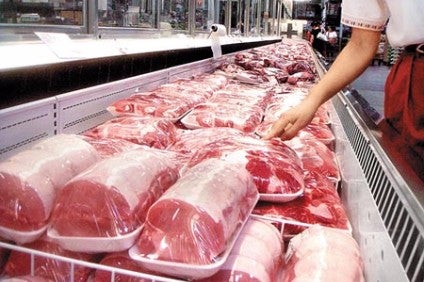
President Donald Trump has ordered US meat-processing plants to stay open during the coronavirus crisis, a move that has drawn a response from trade unions.
He is signing an executive order to that effect against a backdrop of plant closures, Covid-19 infections and warnings about meat shortages in US supermarkets. The order also protects meat processors from legal challenges should employees contract the virus.

Discover B2B Marketing That Performs
Combine business intelligence and editorial excellence to reach engaged professionals across 36 leading media platforms.
Before issuing the executive order, Trump told reporters in the Oval Office that it “will solve any liability problems”, adding, “and we always work with the farmers. There’s plenty of supply.”
Meat giants such as Tyson, Hormel, Smithfield and Cargill have all been forced to shutter facilities temporarily in recent weeks, leading Tyson chairman John Tyson to say the “food supply chain is breaking”.
But Trump’s move has not pleased trade unions, which have been campaigning for worker safety to be improved in the meat plants.
Stuart Appelbaum, president of the Retail, Wholesale and Department Store Union (RWDSU), said: “We only wish that this administration cared as much about the lives of working people as it does about meat, pork and poultry products.

US Tariffs are shifting - will you react or anticipate?
Don’t let policy changes catch you off guard. Stay proactive with real-time data and expert analysis.
By GlobalData“When poultry plants shut down, it’s for deep cleaning and to save workers’ lives. If the administration had developed meaningful safety requirements early on, as they should have, and still must do, this would not even have become an issue. Employers and government must do better.
“If they want to keep the meat and poultry-supply chain healthy, they need to make sure that workers are safe and healthy.”
Announcing the new measure yesterday (28 April), Trump said: “We’re working very hard to make sure our food-supply chain is sound and plentiful”.
A White House statement said he is using the Defense Production Act to “ensure that Americans have a reliable supply of products like beef, pork, and poultry”.
It added: “Under the order, the Department of Agriculture is directed to ensure America’s meat and poultry processors continue operations uninterrupted to the maximum extent possible.”
The statement went on: “Closure of meat and poultry processing plants can quickly have an outsized impact on our nation’s food-supply chain.
“Given the high concentration of meat and poultry processors in a relatively small number of large facilities, closure of any of these plants could disrupt our food supply and detrimentally impact our hardworking farmers and ranchers.
“Closure of a single large beef-processing plant can result in the loss of over ten million servings of beef in a single day. Similarly, the closure of a single plant can eliminate more than 80% of the supply of a particular meat product – like ground beef – to an entire grocery store chain.
“Failure to process livestock could force millions of pounds of meat to disappear from the market, potentially leading to long-term disruptions in our supply chain.”
Guilherme Cavalcanti, chief financial officer of Brazilian meat giant JBS, which has been forced to close plants in the US in recent weeks following Covid-19 outbreaks amongst its workforce, praised Trump’s decision in a live webcast.
The move was welcomed by industry body the North American Meat Institute.
Its president and CEO Julie Anna Potts said: “By keeping meat and poultry producers operating, the President’s executive order will help avert hardship for agricultural producers and keep safe, affordable food on the tables of American families.”
Mike Brown, president of fellow industry body National Chicken Council (NCC), also welcomed the move.
He said: “We are grateful to President Trump for making this bold decision to protect our country’s food supply during these unprecedented times.”
He said the industry’s biggest challenge has been “inconsistencies among the states and many localities in enforcing CDC (Centers for Disease Control and Prevention) guidelines in plants that add to confusion and can lead to unnecessary shutdowns”.
He added: “This patchwork approach is posing grave risk to the supply chain and threatening great disruption to NCC member companies. There must be a uniform approach across all states and we are hopeful that today’s announcement is a good first step in achieving that goal.”





